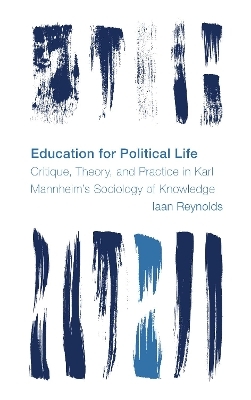
Education for Political Life
Critique, Theory, and Practice in Karl Mannheim's Sociology of Knowledge
Seiten
2023
Rowman & Littlefield (Verlag)
978-1-5381-7188-2 (ISBN)
Rowman & Littlefield (Verlag)
978-1-5381-7188-2 (ISBN)
Situating Karl Mannheim in a tradition of critical social philosophy, Iaan Reynolds argues that Mannheim’s early explorations in the sociology of knowledge offer a novel approach to this tradition since they emphasize the need for social research to cultivate the critical self-awareness of social researchers.
Through a detailed reading of Karl Mannheim’s early explorations in the sociology of knowledge, this book argues for Mannheim's relevance to contemporary social and political philosophy. During a time in which critical social and political philosophy is concerned with relating thought to its historical conditions—a trend seen, for example, in standpoint epistemology and the recent resurgence of ideology critique—Mannheim’s sociology of knowledge emphasizes the need for such a project to combine its sociohistorical analyses with reflexive self-examination. In this way, Mannheim contends with critical social thought’s tendency to obscure its own perspective.
Beginning with the criticism of neo-Kantian and positivist epistemologies found in Mannheim’s interwar German works, Education for Political Life: Critique, Theory, and Practice in Karl Mannheim’s Sociology of Knowledge reconstructs his struggle for theoretical and practical orientation amidst this period’s crisis of life and thought. The treatment of Mannheim’s innovative blend of phenomenology and Marxist social theory found here deepens an appreciation of the sociology of knowledge’s philosophical vision by calling attention to this project’s interwoven subjective and objective dimensions. This allows us to better understand the function of philosophical critique in Mannheim’s work, as well as his location of this function in the intellectual stratum.
Mannheim’s conception of intellectuals dedicated to inner-outer orientation is one of the most distinctive and problematic aspects of his sociology of knowledge. For this reason, this book’s philosophical reconstruction necessitates an internal criticism of Mannheim’s sociology of knowledge, showing how the insights developed in this research program provide the best standard with which to assess its strengths and limitations.
Through a detailed reading of Karl Mannheim’s early explorations in the sociology of knowledge, this book argues for Mannheim's relevance to contemporary social and political philosophy. During a time in which critical social and political philosophy is concerned with relating thought to its historical conditions—a trend seen, for example, in standpoint epistemology and the recent resurgence of ideology critique—Mannheim’s sociology of knowledge emphasizes the need for such a project to combine its sociohistorical analyses with reflexive self-examination. In this way, Mannheim contends with critical social thought’s tendency to obscure its own perspective.
Beginning with the criticism of neo-Kantian and positivist epistemologies found in Mannheim’s interwar German works, Education for Political Life: Critique, Theory, and Practice in Karl Mannheim’s Sociology of Knowledge reconstructs his struggle for theoretical and practical orientation amidst this period’s crisis of life and thought. The treatment of Mannheim’s innovative blend of phenomenology and Marxist social theory found here deepens an appreciation of the sociology of knowledge’s philosophical vision by calling attention to this project’s interwoven subjective and objective dimensions. This allows us to better understand the function of philosophical critique in Mannheim’s work, as well as his location of this function in the intellectual stratum.
Mannheim’s conception of intellectuals dedicated to inner-outer orientation is one of the most distinctive and problematic aspects of his sociology of knowledge. For this reason, this book’s philosophical reconstruction necessitates an internal criticism of Mannheim’s sociology of knowledge, showing how the insights developed in this research program provide the best standard with which to assess its strengths and limitations.
Iaan Reynolds is an assistant professor of philosophy at Utah Valley University. His current research concerns concepts of cultivation and educational development in critical theory and the history of social and political philosophy.
Introduction – The Philosophical Core of the Sociology of Knowledge
Chapter 1 – Critical Social Philosophy
Chapter 2 – Crisis, Disorientation, and the Task of Philosophy
Chapter 3 – “A New Philosophical Regarding of the World”
Chapter 4 – Critique, Self-Orientation, and the Reformulation of Life
Chapter 5 – The Practioners of Critique
Chapter 6 – What is Orthodox Sociology of Knowledge?
Conclusion – Philosophy and the Education of Critique
Bibliography
About the Author
| Erscheinungsdatum | 12.07.2023 |
|---|---|
| Verlagsort | Lanham, MD |
| Sprache | englisch |
| Maße | 157 x 237 mm |
| Gewicht | 540 g |
| Themenwelt | Geisteswissenschaften ► Philosophie ► Erkenntnistheorie / Wissenschaftstheorie |
| ISBN-10 | 1-5381-7188-0 / 1538171880 |
| ISBN-13 | 978-1-5381-7188-2 / 9781538171882 |
| Zustand | Neuware |
| Haben Sie eine Frage zum Produkt? |
Mehr entdecken
aus dem Bereich
aus dem Bereich
die Grundlegung der modernen Philosophie
Buch | Softcover (2023)
C.H.Beck (Verlag)
CHF 25,20
Buch | Softcover (2023)
Reclam, Philipp (Verlag)
CHF 9,80


![Was heißt Denken?. Vorlesung Wintersemester 1951/52. [Was bedeutet das alles?] - Martin Heidegger](/media/113619842)